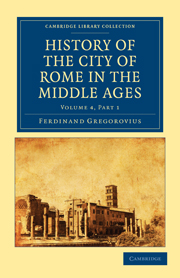CHAPTER I
Published online by Cambridge University Press: 05 October 2010
Summary
The eleventh century forms one of the most important epochs in the annals of the Papacy. A greater contrast between the utter decay and the sudden revival of the same power is nowhere else encountered in history. The extinction of the house of Otto was succeeded by conditions which resembled the conditions that had followed the extinction of the Carolingian Empire. The papal power sank both morally and politically, while the city exerted itself to obtain its final emancipation from the papal yoke. Its efforts proved unsuccessful, since the Papacy remained an indestructible principle hostile to civic development, a principle which could only be temporarily repressed but could never be removed, and which, through the aid of foreign powers, was always able to recover its ascendency. In Rome no burgher class existed sufficiently strong to form a firm foundation for a secular constitution. There still remained merely the powerful noble families, the captains or great feudal vassals of the Church in city and country, who snatched the power from the Pope, to quarrel for it among themselves. These men ruled Rome as patricians in the first half of the eleventh century; they appointed popes from amongst their relatives, and made the Sacred Chair a family possession, and the Papacy fell into a condition of such utter barbarism that the times of the most infamous emperors of antiquity seemed to have been renewed. Then followed, however, that memorable reaction which, with marvellous rapidity, raised the Roman Church into a cosmopolitan power.
- Type
- Chapter
- Information
- History of the City of Rome in the Middle Ages , pp. 1 - 46Publisher: Cambridge University PressPrint publication year: 2010First published in: 1896



